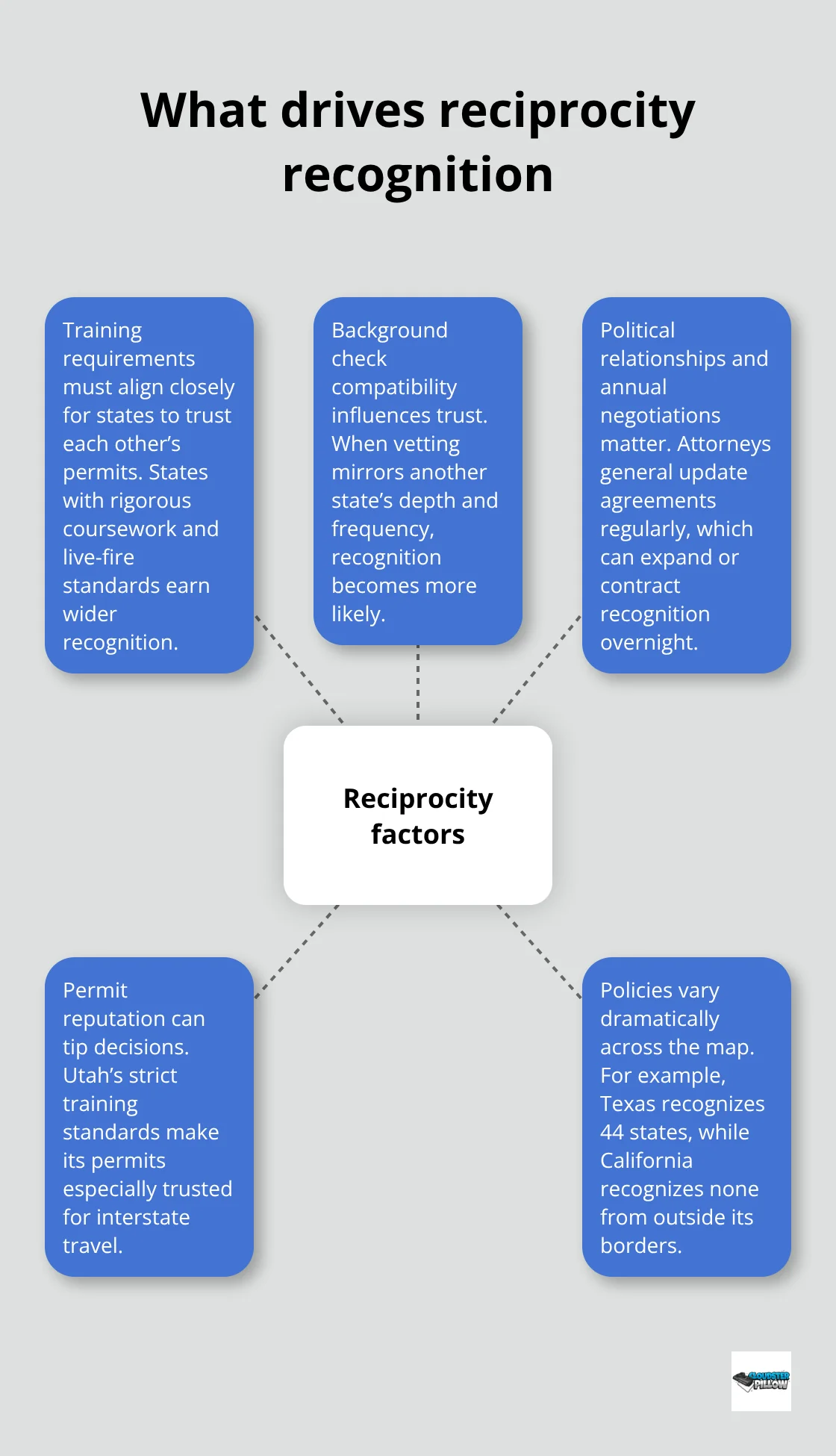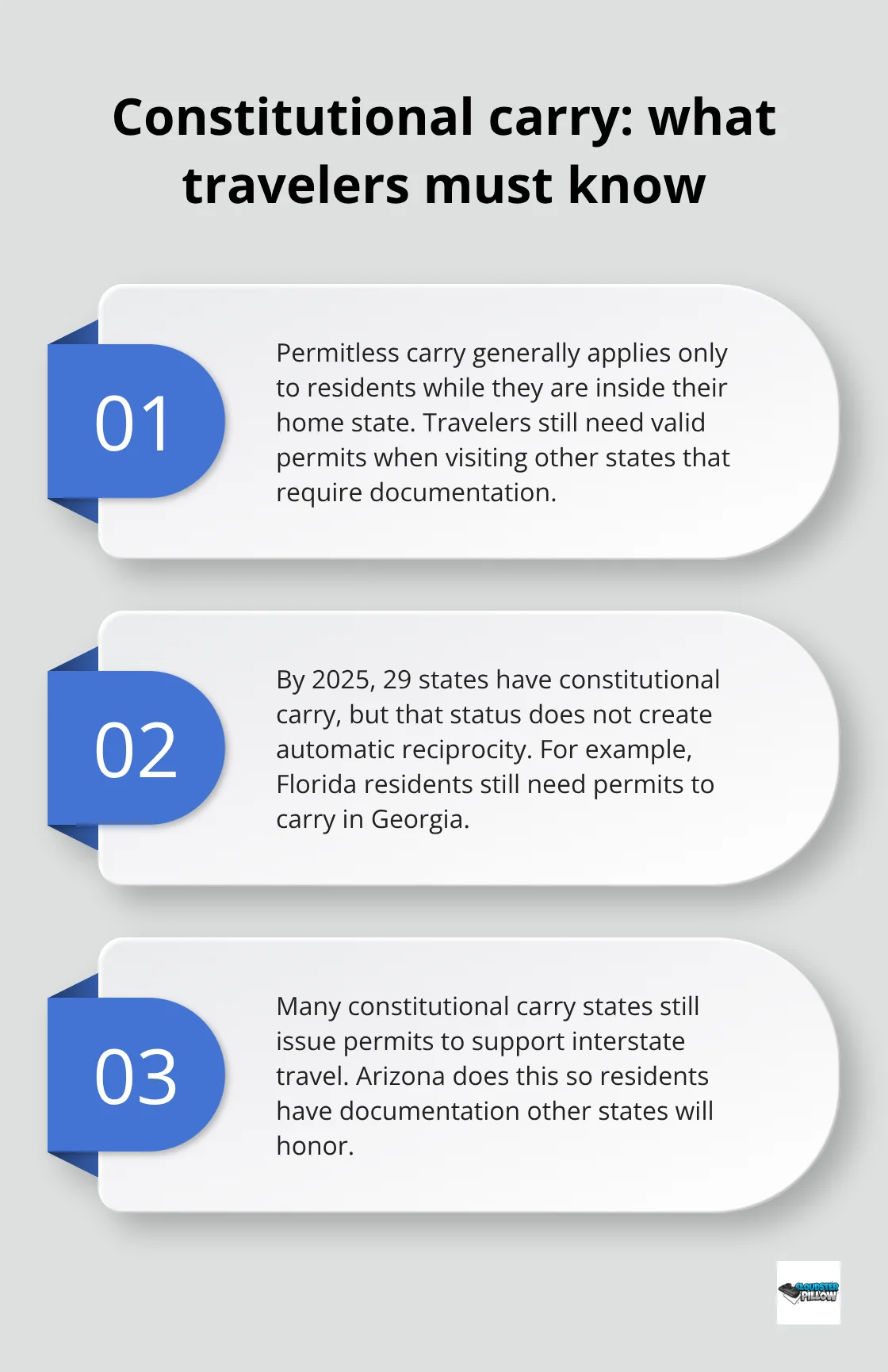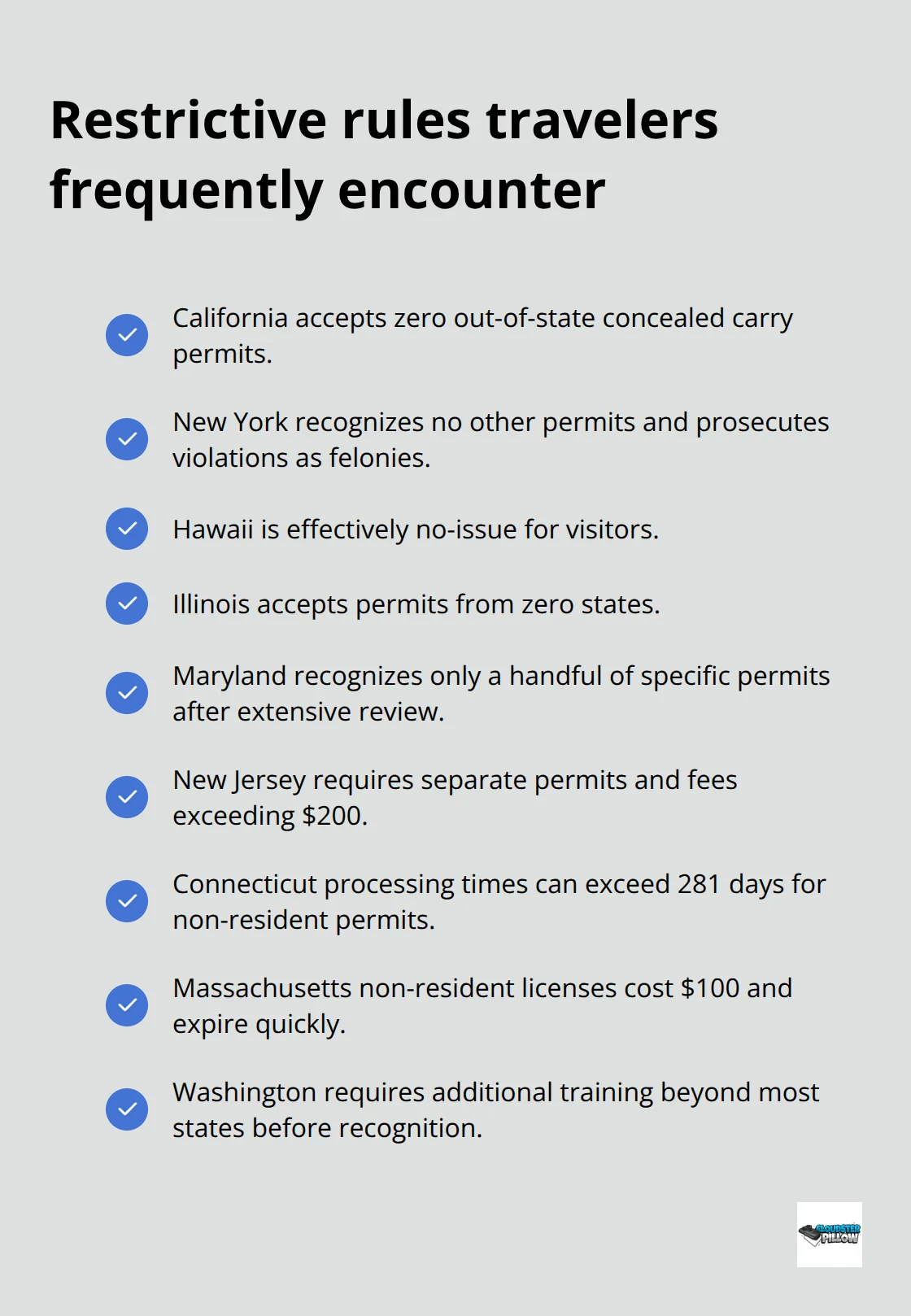Uncategorized
Which States Honor Your Concealed Carry Permit in 2025?
Your concealed carry permit might work in 30+ states, but CCW reciprocity laws shift constantly. Some states welcome nearly all permits, while others reject most out-of-state credentials entirely.
We at Cloudster Pillow see how confusing these laws can be for responsible carriers planning trips or relocating. The 2025 landscape includes new constitutional carry states and updated agreements that directly impact where you can legally carry.
How Do Reciprocity Laws Actually Work?
State-Level Agreements Define Recognition
Reciprocity agreements function as state-level contracts where governments agree to honor each other’s concealed carry permits. Texas recognizes permits from 44 states, while California accepts permits from zero states outside their borders. These agreements depend on training requirements, background check standards, and political relationships between state governments. Utah maintains strict training standards that other states trust, making their permits valuable for interstate travel.

Constitutional Carry Creates Travel Confusion
Constitutional carry states like Arizona and Wyoming allow permitless carry for residents, but this creates confusion for travelers. Arizona residents can carry without permits at home, yet Arizona still issues permits for out-of-state travel because other states require documentation. 29 states have constitutional carry by 2025, but these laws don’t automatically grant reciprocity elsewhere. Florida residents still need permits to carry in Georgia (despite both states having strong gun rights).

Constitutional carry only applies within state borders.
Political Changes Drive Law Updates
Reciprocity agreements change based on election outcomes and legislative sessions. North Dakota expanded recognition to 40 states after 2024 elections, while New York tightened restrictions after Supreme Court decisions. State attorneys general negotiate these agreements annually, which means your permit’s validity can shift without warning. Smart carriers check current laws before every trip because yesterday’s valid permit might become worthless tomorrow.
The complexity of these agreements becomes even more apparent when you examine which states offer the broadest recognition for travelers.
Which States Offer the Best Reciprocity Coverage?
States That Welcome Nearly All Permits
Utah leads reciprocity recognition by honoring permits from all other states and counties, which makes it the gold standard for interstate travel. Utah’s rigorous training requirements earn trust from other states and create broad acceptance. Texas follows closely with recognition from 44 states, while Arizona honors permits from 43 states despite its constitutional carry status.
Virginia accepts permits from 42 states and offers valuable non-resident permits that work in 34 other states. North Dakota expanded to 40 states in 2024 and positions itself as a top choice for travelers. These states maintain consistent policies that rarely change and provide reliability for multi-state trip plans.
Constitutional Carry States Create Travel Advantages
Florida remains the smartest choice for frequent travelers because their permit works in 36 states while they maintain constitutional carry benefits at home. Alaska offers similar advantages with permits that other states recognize in 35 locations, though their harsh winters limit tourism appeal.
Montana and Wyoming provide constitutional carry locally plus permits that work across 30+ states (perfect for western road trips). Nevada casinos and entertainment make it a popular destination, and their permits work in 32 states for return travelers. These states prove that constitutional carry and strong reciprocity can coexist and give residents maximum flexibility.
High-Recognition Permits Worth Considering
Several states issue permits that travelers prize for their broad acceptance rates. Florida permits work exceptionally well for East Coast travel, while Utah permits excel in western and southern states. Virginia non-resident permits appeal to travelers from restrictive states because they require minimal residency proof.
The application process varies significantly between these high-recognition states. Some states process applications within weeks, while others take months to issue permits. However, not all states welcome out-of-state carriers with equal enthusiasm, and some impose strict limitations that catch travelers off guard. Always verify this information using a comprehensive Reciprocity Map to check which states honor your permit.
Which States Block Most Out-of-State Permits?
Restrictive States Create Travel Nightmares
California accepts zero out-of-state concealed carry permits and requires visitors to transport firearms unloaded in locked containers. New York recognizes no other state permits and prosecutes violations aggressively with felony charges that destroy careers. Hawaii maintains a no-issue policy that makes permits nearly impossible for residents and completely unavailable for visitors.
Illinois accepts permits from zero states despite constitutional carry pressure, while Maryland recognizes only a handful of specific permits after extensive review processes. These states view out-of-state permits as worthless paper regardless of training requirements or background check standards.
Additional Permit Requirements Cost Time and Money
New Jersey requires separate permits for transport and possession, with fees that exceed $200 plus mandatory training courses that take weeks to complete. Connecticut demands additional permits for non-residents who want to carry during visits, with processing times that can exceed 281 days.
Massachusetts requires visitors to obtain non-resident licenses that cost $100 and expire quickly (making short trips financially impractical). Washington state imposes training requirements that exceed most other states and forces permit holders to complete additional courses before recognition.
Bureaucratic Barriers Create Legal Traps
Rhode Island accepts some permits but requires written notification to local police departments within specific timeframes. These bureaucratic barriers create legal traps for unprepared travelers who assume their home state permits provide universal coverage.

Delaware and New Jersey both require separate applications with extensive documentation that most travelers cannot provide on short notice. Processing delays often exceed stated timeframes, which leaves travelers in legal limbo while applications sit in government offices for months.
Final Thoughts
CCW reciprocity laws change constantly based on political shifts and legislative updates. Smart carriers verify current laws before every trip and avoid assumptions about permit validity. States like California and New York prosecute violations with felony charges, while others welcome most permits without question.
Complex interstate carry laws demand careful preparation and reliable gear that works across multiple jurisdictions. Processing times for additional permits often exceed 200 days (making spontaneous travel nearly impossible in restrictive states). Extended trips require comfortable carry solutions that maintain concealment throughout long days and various activities.
We at Cloudster Pillow know how uncomfortable gear compromises your readiness during multi-state travel. Our holster wedge improves all-day comfort for AIWB and IWB holsters while maintaining consistent concealment. When reciprocity laws create enough challenges, your carry gear should provide reliable comfort and performance.

